物流外包选择因素
物流外包的主要原因

物流外包的主要原因
(一)、降低成本
与企业自营物流相比,许多第三方物流服务供应商在办内外都拥有良好的运输和分销网络,在组织企业的物流活动方面更有经验,更专业化。
所以通过物流业务外包,企业可以降低因拥有运输设备,仓库和其它物流设施所必需的投资,从而把更多的资金投在公司的核心业务上。
(二)、提升企业效率
在企业资源有限的情况下,把企业的物流业务外包给专门的物流管理部门来承担,特别是一些特殊的物流运输业务。
通过外包给第三方物流服务的供应商,企业能够把时间和精力放在自己的核心业务上,提高了供应链管理和企业运作的效率。
(三)、分担企业风险,提高企业的柔性
企业通过外向资源配置,取消了企业与用户双方各自独立拥有的库存和运输,从而分散了由政府、市场、财务等因素产生的风险,促进了资源的优化组合,增加了供应链的柔性,使企业更能适应外部环境的变化。
(四)、快速响应客户需求
现在企业之间的竞争主要在于时间和速度上的竞争,第三方物流服务供应商由于其专业化和规模效应的优势,能够快速地对客户的需求进行回应。
如何选择第三方物流供应商?
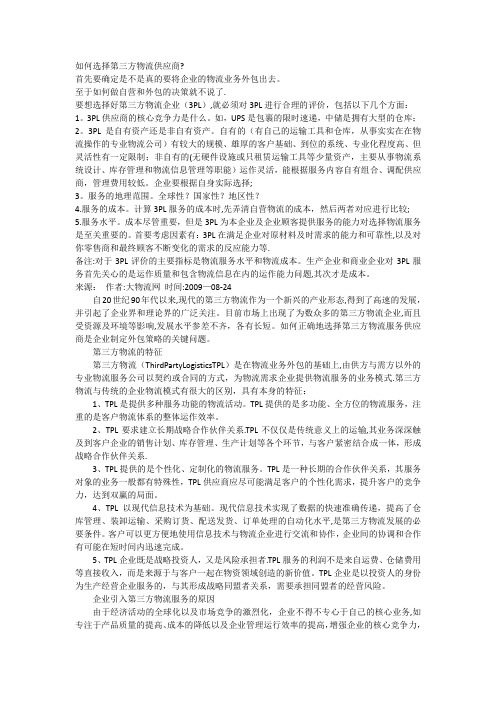
如何选择第三方物流供应商?首先要确定是不是真的要将企业的物流业务外包出去。
至于如何做自营和外包的决策就不说了.要想选择好第三方物流企业(3PL),就必须对3PL进行合理的评价,包括以下几个方面:1。
3PL供应商的核心竞争力是什么。
如,UPS是包裹的限时速递,中储是拥有大型的仓库;2。
3PL是自有资产还是非自有资产。
自有的(有自己的运输工具和仓库,从事实实在在物流操作的专业物流公司)有较大的规模、雄厚的客户基础、到位的系统、专业化程度高、但灵活性有一定限制;非自有的(无硬件设施或只租赁运输工具等少量资产,主要从事物流系统设计、库存管理和物流信息管理等职能)运作灵活,能根据服务内容自有组合、调配供应商,管理费用较低。
企业要根据自身实际选择;3。
服务的地理范围。
全球性?国家性?地区性?4.服务的成本。
计算3PL服务的成本时,先弄清自营物流的成本,然后两者对应进行比较;5.服务水平。
成本尽管重要,但是3PL为本企业及企业顾客提供服务的能力对选择物流服务是至关重要的。
首要考虑因素有:3PL在满足企业对原材料及时需求的能力和可靠性,以及对你零售商和最终顾客不断变化的需求的反应能力等.备注:对于3PL评价的主要指标是物流服务水平和物流成本。
生产企业和商业企业对3PL服务首先关心的是运作质量和包含物流信息在内的运作能力问题,其次才是成本。
来源:作者:大物流网时间:2009—08-24自20世纪90年代以来,现代的第三方物流作为一个新兴的产业形态,得到了高速的发展,并引起了企业界和理论界的广泛关注。
目前市场上出现了为数众多的第三方物流企业,而且受资源及环境等影响,发展水平参差不齐,各有长短。
如何正确地选择第三方物流服务供应商是企业制定外包策略的关键问题。
第三方物流的特征第三方物流(ThirdPartyLogisticsTPL)是在物流业务外包的基础上,由供方与需方以外的专业物流服务公司以契约或合同的方式,为物流需求企业提供物流服务的业务模式.第三方物流与传统的企业物流模式有很大的区别,具有本身的特征:1、TPL是提供多种服务功能的物流活动。
物流外包、自营案例分析要点
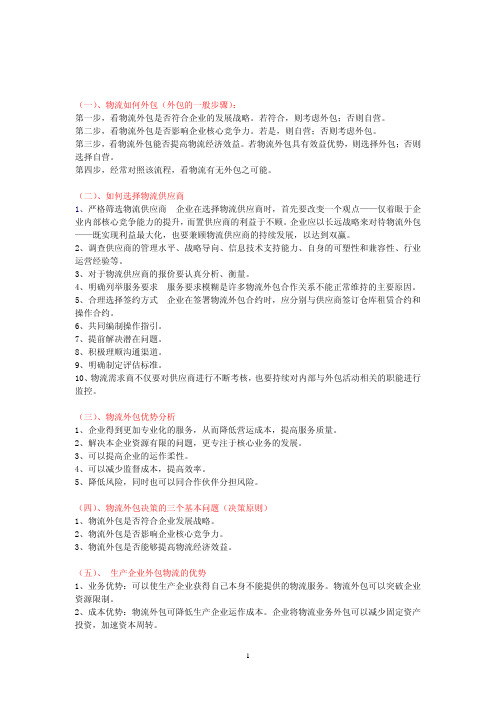
物流外包、自营案例分析要点(一)、物流如何外包(外包的一般步骤):第一步,看物流外包是否符合企业的发展战略。
若符合,则考虑外包;否则自营。
第二步,看物流外包是否影响企业核心竞争力。
若是,则自营;否则考虑外包。
第三步,看物流外包能否提高物流经济效益。
若物流外包具有效益优势,则选择外包;否则选择自营。
第四步,经常对照该流程,看物流有无外包之可能。
(二)、如何选择物流供应商1、严格筛选物流供应商 企业在选择物流供应商时,首先要改变一个观点——仅着眼于企业内部核心竞争能力的提升,而置供应商的利益于不顾。
企业应以长远战略来对待物流外包——既实现利益最大化,也要兼顾物流供应商的持续发展,以达到双赢。
2、调查供应商的管理水平、战略导向、信息技术支持能力、自身的可塑性和兼容性、行业运营经验等。
3、对于物流供应商的报价要认真分析、衡量。
4、明确列举服务要求 服务要求模糊是许多物流外包合作关系不能正常维持的主要原因。
5、合理选择签约方式 企业在签署物流外包合约时,应分别与供应商签订仓库租赁合约和操作合约。
6、共同编制操作指引。
7、提前解决潜在问题。
8、积极理顺沟通渠道。
9、明确制定评估标准。
10、物流需求商不仅要对供应商进行不断考核,也要持续对内部与外包活动相关的职能进行监控。
(三)、物流外包优势分析1、企业得到更加专业化的服务,从而降低营运成本,提高服务质量。
2、解决本企业资源有限的问题,更专注于核心业务的发展。
3、可以提高企业的运作柔性。
4、可以减少监督成本,提高效率。
5、降低风险,同时也可以同合作伙伴分担风险。
(四)、物流外包决策的三个基本问题(决策原则)1、物流外包是否符合企业发展战略。
2、物流外包是否影响企业核心竞争力。
3、物流外包是否能够提高物流经济效益。
(五)、 生产企业外包物流的优势1、业务优势:可以使生产企业获得自己本身不能提供的物流服务。
物流外包可以突破企业资源限制。
2、成本优势:物流外包可降低生产企业运作成本。
物流外包

2、物流运作效率。第三方物流运作的作 业效率是企业关注的问题之一。很多企业希望减 少仓库的面积甚至达到零库存,这样就对第三方 物流企业进行运输和配送提出较高的要求。如果 经常性的无法及时送货,企业将无法进行正常的 生产和销售,进而影响企业的声誉。单据的准确 率和货物的完好率也将影响企业的产品质量,没 有良好的运输、配送和仓储物流服务,企业将无 法正常运作。因此,第三方物流服务商的作业效 率也是企业进行外包选择的一个最重要的因素, 具体指标包括:物流运作准确率、物流运作完好率、 物流运作速度。
企业需要一个完整有效的物流外包服 务商选择指标体系来对各个物流服务商进 行选择,通过认真、详细的评价工作,找 出满足企业要求的最优物流外包服务商。 综上所述,我们构建的物流外包服务商选 择指标体系主要包括物流成本指标、物流 运作效率指标、服务商基本素质指标和技
术水平指标。
(1)运输成本:主要包括运输设施工具、运输 人员、运输耗能等在运输活动过程中发生的各项 成本。由于运输费用在全部物流费用中占很大比 例,通常占物流总成本的40%以上,因此,运输 费用的减低,对物流需求企业而言是运输合理化 的一个重要目标。运输费用往往成为各种合理化 措施实施是否行之有效的最终判断依据。 (2)仓储成本:主要包括一次采购费用及库存持 有成本。一次采购费用是第三方物流企业在采购 商品时每次所固定支出的费用,库存持有成本主 要由投资于仓库的固定资产及保管费用等构成。
被绿色吹过の春天
一 次
绿
初
色
的
春
旅 行
The End
ቤተ መጻሕፍቲ ባይዱ
带上相机 记录那些可爱的画面
企业在选择物流运作 模式时,一般有三种 选择:自营物流、协作 物流或物流外包。
1、企业对物流控制力的要求。市场竞争不 是很激烈的行业,如果企业对物流活动控制的需 要程度较低,企业会选择物流外包,从而将精力 集中在主营业务上,强化企业的核心竞争力。 2、企业的规模和实力。 3、物流成本和效率。如果企业选择物流外包 的总成本小于企业自营的成本,企业会选择物流 外包。同时,效率也是企业选择物流模式的重要 因素之一 。 4、物流外包服务商的客户服务能力。第三方 物流服务商的服务能力越强,企业就会倾向于物
吸引企业物流业务外包的原因
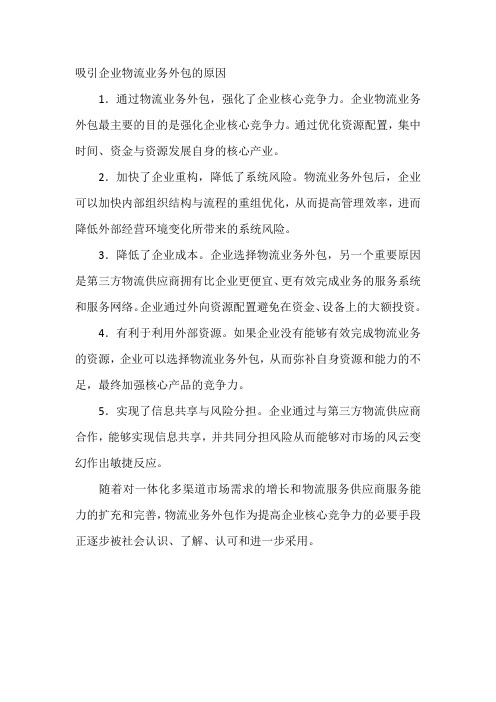
吸引企业物流业务外包的原因
1.通过物流业务外包,强化了企业核心竞争力。
企业物流业务外包最主要的目的是强化企业核心竞争力。
通过优化资源配置,集中时间、资金与资源发展自身的核心产业。
2.加快了企业重构,降低了系统风险。
物流业务外包后,企业可以加快内部组织结构与流程的重组优化,从而提高管理效率,进而降低外部经营环境变化所带来的系统风险。
3.降低了企业成本。
企业选择物流业务外包,另一个重要原因是第三方物流供应商拥有比企业更便宜、更有效完成业务的服务系统和服务网络。
企业通过外向资源配置避免在资金、设备上的大额投资。
4.有利于利用外部资源。
如果企业没有能够有效完成物流业务的资源,企业可以选择物流业务外包,从而弥补自身资源和能力的不足,最终加强核心产品的竞争力。
5.实现了信息共享与风险分担。
企业通过与第三方物流供应商合作,能够实现信息共享,并共同分担风险从而能够对市场的风云变幻作出敏捷反应。
随着对一体化多渠道市场需求的增长和物流服务供应商服务能力的扩充和完善,物流业务外包作为提高企业核心竞争力的必要手段正逐步被社会认识、了解、认可和进一步采用。
快递外包服务方案
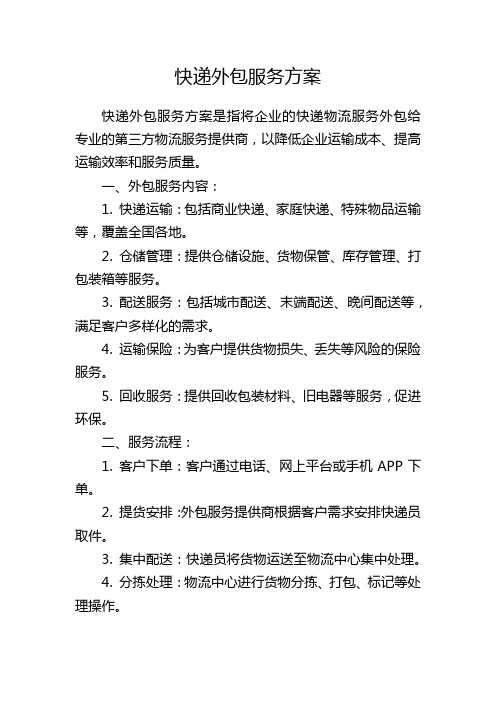
快递外包服务方案快递外包服务方案是指将企业的快递物流服务外包给专业的第三方物流服务提供商,以降低企业运输成本、提高运输效率和服务质量。
一、外包服务内容:1. 快递运输:包括商业快递、家庭快递、特殊物品运输等,覆盖全国各地。
2. 仓储管理:提供仓储设施、货物保管、库存管理、打包装箱等服务。
3. 配送服务:包括城市配送、末端配送、晚间配送等,满足客户多样化的需求。
4. 运输保险:为客户提供货物损失、丢失等风险的保险服务。
5. 回收服务:提供回收包装材料、旧电器等服务,促进环保。
二、服务流程:1. 客户下单:客户通过电话、网上平台或手机APP下单。
2. 提货安排:外包服务提供商根据客户需求安排快递员取件。
3. 集中配送:快递员将货物运送至物流中心集中处理。
4. 分拣处理:物流中心进行货物分拣、打包、标记等处理操作。
5. 运输配送:将货物交付给合作的运输公司进行运输配送。
6. 仓储服务:对于需要仓储的货物,提供仓库管理、库存管理等服务。
7. 末端配送:将货物送达客户指定的末端地点。
8. 客户签收:客户签收货物,并确认收货完成。
三、外包服务优势:1. 成本控制:外包服务可以降低企业的运输成本,通过专业的物流管理、规模效益等手段实现成本控制。
2. 专业服务:外包服务提供商拥有丰富的物流经验和专业的运营团队,能够提供优质的物流服务。
3. 灵活应变:外包服务提供商可以根据客户需求灵活调整运输和配送方案,满足不同客户的特殊需求。
4. 提升效率:外包服务可以通过优化运输路线、提供即时信息跟踪等方式提高运输效率。
5. 服务质量:外包服务提供商通过规范的服务流程、科学的管理和精细化的操作,提高服务质量和客户满意度。
四、安全保障:1. 车辆安全:配备安全设施,定期维护车辆,避免交通事故和货物损坏。
2. 人员安全:快递员经过严格筛选、培训,保证护送货物的人员的安全可靠。
3. 货物保险:为货物投保运输险,确保货物在运输过程中的损失和风险得到补偿。
物流外包决策分析

物流外包决策分析随着全球化和市场化的加快,结构变革也引起了企业对物流外包的关注。
许多企业将物流外包视为提高效率和降低成本的重要手段。
本论文拟从物流外包决策分析的角度,探讨它的概念、决策过程、影响因素和解决方案,从而为企业实际操作提供参考。
一、物流外包的概念物流外包是指将企业内部的物流业务委托给专业的物流服务提供商(第三方物流,3PL)来实现目标的一种策略。
它是企业为了适应市场竞争,提高物流效率和降低成本而采取的一种较为成熟的方式。
二、决策过程1. 决策目标的确定这个阶段的任务是明确企业存在哪些需要解决的问题,为什么需要物流外包。
以提高效率、降低成本、改善服务等方向为目标。
2. 外包决策权的分权企业应针对自身情况,在内部寻找负责人提出物流外包建议,并处理所需程序。
3. 物流外包需求的收集和分析企业应对三方、服务内容、服务质量、价格及合作期限等内容进行调查。
4. 合作伙伴的选择根据企业收集、分析到的数据,进行对比,选择最佳的外包合作伙伴。
5. 合同的制定制定合作协议和合同,明确外包服务的内容、质量标准、支付方式和服务期限等信息。
6. 合作关系的建立尽量减少因沟通、信息不对称等问题造成的合作关系中断,密切合作。
三、影响因素1. 客户需求客户需求是物流外包成立的必要条件。
企业必须了解客户的需求,满足客户的需求,打造吸引力极品物流外包,并以此保证物流外包的价值。
2. 外在环境外在环境是物流外包过程中不可控的因素,它包括、法律、社会文化、经济环境、市场竞争等。
这些因素会制约企业的物流外包决策,影响企业物流外包的效果。
3. 内在因素企业内部的因素就是企业自身的情况,如企业文化、组织结构、信息技术、物流水平等。
这些因素对物流外包决策的影响较为直接,也反映了企业物流外包的主要瓶颈。
四、解决方案1. 选择合适的合作伙伴在选择合作伙伴方面,企业可以从多个角度着手。
首先,应综合考虑伙伴的服务、专业程度、成本、信誉、有效时间和企业内容等方面。
企业物流外包的决策分析及风险防范
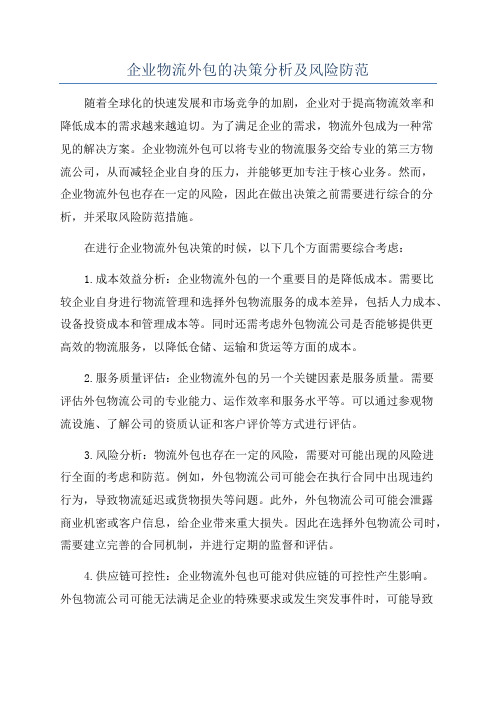
企业物流外包的决策分析及风险防范随着全球化的快速发展和市场竞争的加剧,企业对于提高物流效率和降低成本的需求越来越迫切。
为了满足企业的需求,物流外包成为一种常见的解决方案。
企业物流外包可以将专业的物流服务交给专业的第三方物流公司,从而减轻企业自身的压力,并能够更加专注于核心业务。
然而,企业物流外包也存在一定的风险,因此在做出决策之前需要进行综合的分析,并采取风险防范措施。
在进行企业物流外包决策的时候,以下几个方面需要综合考虑:1.成本效益分析:企业物流外包的一个重要目的是降低成本。
需要比较企业自身进行物流管理和选择外包物流服务的成本差异,包括人力成本、设备投资成本和管理成本等。
同时还需考虑外包物流公司是否能够提供更高效的物流服务,以降低仓储、运输和货运等方面的成本。
2.服务质量评估:企业物流外包的另一个关键因素是服务质量。
需要评估外包物流公司的专业能力、运作效率和服务水平等。
可以通过参观物流设施、了解公司的资质认证和客户评价等方式进行评估。
3.风险分析:物流外包也存在一定的风险,需要对可能出现的风险进行全面的考虑和防范。
例如,外包物流公司可能会在执行合同中出现违约行为,导致物流延迟或货物损失等问题。
此外,外包物流公司可能会泄露商业机密或客户信息,给企业带来重大损失。
因此在选择外包物流公司时,需要建立完善的合同机制,并进行定期的监督和评估。
4.供应链可控性:企业物流外包也可能对供应链的可控性产生影响。
外包物流公司可能无法满足企业的特殊要求或发生突发事件时,可能导致供应链中断或运作不畅。
因此在选择外包物流公司时,需要评估其灵活性和适应能力,确保能够满足企业的需求。
为了降低企业物流外包的风险,可以采取以下的风险防范措施:1.建立合作伙伴关系:与外包物流公司建立长期的合作伙伴关系,通过共同成长和深入合作来增强互信和合作意识,减少合作中的不确定性。
2.建立完善的合同机制:合同是企业与外包物流公司之间的重要法律依据,应明确双方的权责义务,确保服务质量、物流安全和数据保密等方面的要求。
企业物流外包策略的选择

本 文 讨 论 的 重 点 是 企 业 外 包 策略 的选 择 , 首 先 分析 企 业在 物 流 外 包和 自营 上 的 选择 ,接 着 进 一 步展 开 论 述 物 流 外 包 方 式 的选 择 ; 然 后 分 析 企业 如 何
选择 物流服 务供应 , 最后 , 站在 信息时
代 的 背 景 下 ,进 一 步 思 考 和 研 究 企 业 物 流 外 包 策略 的 选 择 。
【 关键词】
物流外 包;第三方物流;核 心竞争力;
外 包策略
一
.
前 言
处在 2 世 纪 的今 天 , 关物 流 业 的研 l 有 究在 我 国 已经 广 泛 开展 起来 ,并 取 得 了一 系列 重 要 成 果 。企 业物 流 ,作 为 物 流 业 的 主体越来越受到各界的重视 ,企业物流业 务 外包 的决 策 方 案 一直 是 关注 的重 点 。 随 着 专业 物 流 经 营理 论 的 成型 ,企 业 物 流 外 包 己经 成 为研 讨 的 热点 问题 之 一 , 已经 有 越来越多的企业将 自己的物流业务委托给 第 三 方 物 流 公 司来 完成 。但 是 ,如 何 定性 地 确 定 企 业 物 流 外 包 的条 件 ,如 何 定 量地 选择第三方物流企 业来帮助 自己完成企 业 的物流服务 ,物流外包过程 中委托一 代理 双方之间的风险等等物流业务外包的策略 问题 ,无 论是 从 理 论 还 是 实 际工 作 中都 值 得 探 讨 研 究 。 本 文 不再 研 究 企 业 物 流 外包 的理论模型 ,也不再分析我国物流企业外 包 的现 状 ,直接 深 入 探 讨企 业物 流 外包 策 略 的选 择 。 企业在物流外包的过程 中,不仅要考 虑 企 业 自身的 因 素 ,同时 也 需考 虑外 部 环
物流业务外包的成因及形式
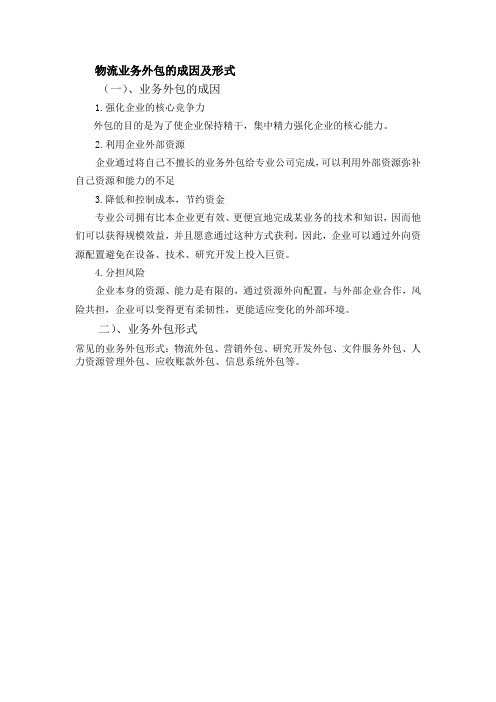
物流业务外包的成因及形式
(一)、业务外包的成因
1.强化企业的核心竞争力
外包的目的是为了使企业保持精干,集中精力强化企业的核心能力。
2.利用企业外部资源
企业通过将自己不擅长的业务外包给专业公司完成,可以利用外部资源弥补自己资源和能力的不足
3.降低和控制成本,节约资金
专业公司拥有比本企业更有效、更便宜地完成某业务的技术和知识,因而他们可以获得规模效益,并且愿意通过这种方式获利。
因此,企业可以通过外向资源配置避免在设备、技术、研究开发上投入巨资。
4.分担风险
企业本身的资源、能力是有限的,通过资源外向配置,与外部企业合作,风险共担,企业可以变得更有柔韧性,更能适应变化的外部环境。
二)、业务外包形式
常见的业务外包形式:物流外包、营销外包、研究开发外包、文件服务外包、人力资源管理外包、应收账款外包、信息系统外包等。
如何选中小企业物流外包

如何选中小企业物流外包如何选择适合小企业的物流外包服务一、引言物流外包是指企业将自身的物流业务委托给专业的第三方物流服务提供商来进行管理和运作。
对于小型企业来说,外包物流服务可以企业节省成本、提高效率、专注核心业务等方面带来诸多好处。
然而,在选择合适的物流外包服务供应商时,小企业应考虑一些关键因素,以确保选择出最合适的供应商。
本文将详细介绍如何选中适合小企业的物流外包服务。
二、需求分析1. 审查企业的物流需求:企业在考虑物流外包服务时,首先需要明确自身的物流需求,包括货物种类、运输范围、业务量等。
这将有助于筛选出符合企业需求的物流外包服务供应商。
2. 考虑物流外包的动机:小企业外包物流的主要动机可能包括降低成本、提高服务水平、缩短供应链时间等。
企业需明确自身的外包目标,以便在选择供应商时能够对照考察。
三、供应商筛选1. 评估供应商的专业能力:企业可通过对供应商的企业规模、经验、技术水平等方面进行评估,判断供应商是否具备满足自身需求的能力。
2. 了解供应商的服务范围:企业需核实供应商的服务范围是否与自身需求相匹配。
涉及到的服务包括仓储管理、货运运输、配送服务、供应链管理等。
3. 考察供应商的服务质量:企业可通过查阅供应商的客户反馈以及对现有客户进行调研,了解供应商在服务质量方面的表现。
4. 比较供应商的价格:企业可向多个供应商询价并进行比较,综合考虑服务质量与价格因素,选择最有性价比的供应商。
四、合同签订与监督1. 确定合同事项:企业需明确合同中的物流服务内容、价格、服务期限、违约责任等事项,以减少后期发生的纠纷。
2. 监督合作过程:企业应与供应商建立良好的沟通机制,定期检查供应商的服务质量与履约情况。
如有必要,可以约定监督和考核的方式,确保供应商按合同要求提供服务。
五、附件本所涉及的附件如下:1. 供应商信息表格:用于记录供应商的基本信息,包括企业规模、经验、资质等。
2. 服务需求清单:用于记录企业的物流需求,包括货物种类、运输范围、业务量等。
XX企业物流外包的决策分析

XX企业物流外包的决策分析摘要:物流是企业运作中不可或缺的一环,而外包物流是现代企业实现高效、低成本运作的重要途径。
通过对XX企业外包物流实践的分析,本文提出了外包物流的优势和风险,并运用利润最大化模型、决策树模型和层次分析法等方法进行决策分析。
最终得出,XX企业应该选择与国内外大型物流公司签订长期合作协议,实现物流托管、信息共享和风险共担,降低成本,提高效率。
关键词:物流外包、决策分析、利润最大化模型、决策树模型、层次分析法1. 介绍随着全球化的发展和经济竞争的加剧,企业感受到物流优化的重要性。
物流是指商品从生产地到消费地的运输、储存、配送和管理等操作。
物流不仅关系到产品的生产过程,也直接关系到企业的销售、客户满意度和市场竞争力。
而外包物流则是企业将物流业务委托给专业的第三方物流供应商,使企业专注于自己的核心业务,减少物流成本、风险和管理负担。
有研究显示,外包物流可以平均降低20%的物流成本,提高物流效率和质量[1]。
XX企业作为一家制造业企业,需要处理大量的物流事务,例如采购、生产计划、库存管理、配送和售后服务等。
同时,它也面临着物流成本和风险上升的问题。
因此,XX企业需要对外包物流进行决策分析,从而实现最佳的物流管理策略。
2. 外包物流的优势和风险2.1 优势外包物流的优势主要包括以下几个方面:(1) 降低成本:外包物流可以将物流成本和风险转移给专业的第三方物流供应商,从而减少企业的物流投入和管理负担。
同时,在供应商规模和效率的带动下,可以获得更高的采购力和运营效益,进一步降低企业成本。
(2) 提高效率:专业的第三方物流供应商具有更专业的技术、人力和设施,可以提高物流操作的效率和质量。
对于需要频繁调整物流规模和地点的企业来说,外包物流还可以实现物流的灵活性和效益。
(3) 专注核心业务:外包物流可以将物流和供应链的管理工作全部交给第三方供应商,使企业专注于核心业务和产品的开发和销售。
这也可以提高企业的市场竞争力和创新能力。
物流业务外包
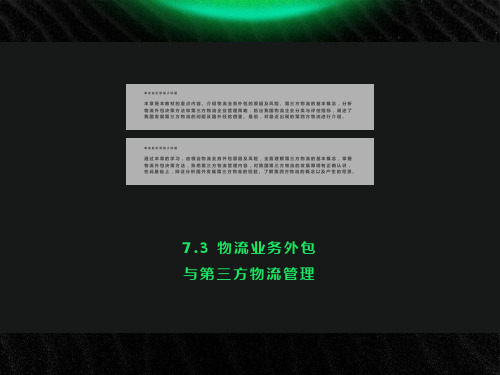
物流供应方通过对运输、储存、装卸、搬运、包装、流通加工、配送和信息管理基本功能的组织与管理来满足客户物流需求的行为。
综合物流服务
为客户制定整体性的物流方案,并对物流活动要素进行规划、组织、实施和系统化运作。
物流信息管理
应用现代信息技术和手段完成物流过程中信息的采集、处理、存储、传输和交换,实现物流信息电子化、数字化、网络化。
0
10家以上
12.7
100
合计
100
100
我国企业使用第三方物流情况
2.信息技术的制约
3.提供物流服务整体解决方案的能力不足
信息技术的应用为快捷地处理多样化繁杂的业务提供了良好的技术支持。 目前,我国现阶段的物流正在发展中,整体物流管理服务供应商还处在初级阶段的水平。
4.物流增值服务缺乏
选择承运人/货物代理/海关代理
86.5
信息管理
81.1
仓储
81.1
咨询
78.4
欧洲第三方物流服务需求内容
美国第三方物流服务内容
服务内容企业类型
包装
单纯仓储
干线运输
市内配送
生产企业
4%
20%
48%
28%
商业企业
14%
28%
29%
29%
我国工商企业使用第三方物流服务的内容 从以上的数据可以看出,在中国无论是第三方物流服务的主要内容比较集中于传统意义上的运输服务和仓储服务。表明这些物流公司对单项服务的内容都有一定的经验,但这不是这正意义上的第三方物流,如何将这种单项服务的内容有机地组合起来,提供物流服务的整体方案,才是第三方物流发展的关键。
13%
74%
13%
电子商务企业选择外包物流的SWOT分析以唯品会为例

感谢观看
优势分析
1、降低物流成本,提高经济效 益
外包物流可以使唯品会将更多的资源和精力集中在自身的核心业务上,从而 降低在物流方面的投入。通过与专业的物流公司合作,唯品会可以实现规模经济, 降低运输和配送成本,提高整体经济效益。业通常拥有丰富的物流网络和先进的物流技术,能够为唯品会提 供更加快速、准确和高效的物流服务。这样,唯品会就可以优化自身的物流流程, 提高配送效率,从而提升用户体验,增加客户黏性。
政府出台了一系列政策来支持电子商务和物流行业的发展。例如,税收优惠、 贷款扶持等政策将为电子商务企业创造更加宽松的发展环境。同时,政策还将鼓 励传统物流企业向数字化、智能化方向转型,这将为电子商务企业带来新的市场 机遇。
挑战分析
1、物流配送范围有限,影响配 送效率
虽然外包物流企业通常拥有覆盖全国的物流网络,但其在某些地区可能存在 配送短板。这就会影响唯品会的配送效率,对客户满意度造成一定的影响。
3、专注自身优势,增强核心竞 争力
唯品会将物流外包出去,可以更专注于自身的核心业务,如商品采购、销售 和市场营销等。这样,唯品会就可以在核心领域投入更多的资源和精力,增强自 身的核心竞争力,提高市场占有率。
劣势分析
1、物流配送时间过长,影响用 户体验
虽然外包物流企业通常拥有高效的物流网络和先进的物流技术,但也可能因 为各种原因导致配送时间过长,从而影响用户体验。例如,物流公司的配送人员 不足、交通拥堵等都会导致配送时间延长。
2、外包物流服务质量不稳定, 影响品牌形象
物流公司的服务质量和效率可能会受到各种因素的影响,如员工素质、运输 设备等。如果物流公司的服务质量不稳定,就会对唯品会的品牌形象造成一定的 负面影响。
3、信息安全问题,导致商业秘 密泄露等
物流公司车辆运输外包方案
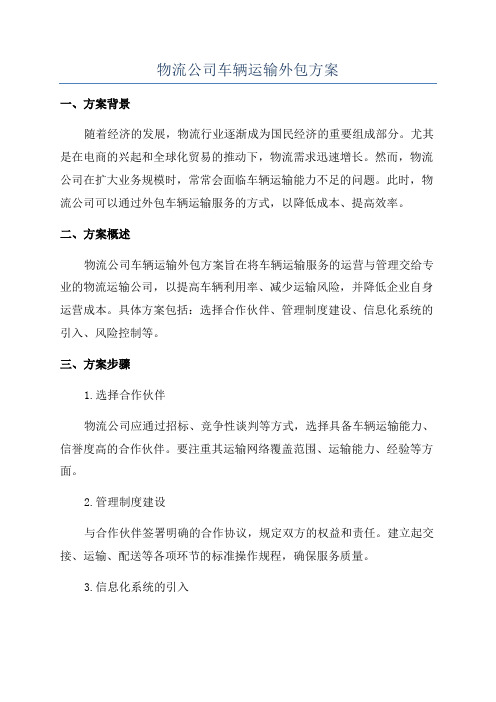
物流公司车辆运输外包方案一、方案背景随着经济的发展,物流行业逐渐成为国民经济的重要组成部分。
尤其是在电商的兴起和全球化贸易的推动下,物流需求迅速增长。
然而,物流公司在扩大业务规模时,常常会面临车辆运输能力不足的问题。
此时,物流公司可以通过外包车辆运输服务的方式,以降低成本、提高效率。
二、方案概述物流公司车辆运输外包方案旨在将车辆运输服务的运营与管理交给专业的物流运输公司,以提高车辆利用率、减少运输风险,并降低企业自身运营成本。
具体方案包括:选择合作伙伴、管理制度建设、信息化系统的引入、风险控制等。
三、方案步骤1.选择合作伙伴物流公司应通过招标、竞争性谈判等方式,选择具备车辆运输能力、信誉度高的合作伙伴。
要注重其运输网络覆盖范围、运输能力、经验等方面。
2.管理制度建设与合作伙伴签署明确的合作协议,规定双方的权益和责任。
建立起交接、运输、配送等各项环节的标准操作规程,确保服务质量。
3.信息化系统的引入与合作伙伴共享信息化系统,建立起全面的物流信息平台。
通过实时跟踪、准确的配送、签收等信息传递,提高运输效率,缩短物流周期,增强客户对物流全过程的可见性。
4.风险控制合作伙伴应通过合理的保险制度,对车辆、货物和运输环节进行保障。
物流公司可以与合作伙伴一同制定风险防控方案,明确责任边界,减少风险的发生和损失。
四、方案优势1.减少成本外包车辆运输可以避免物流公司购买、维护车辆所带来的高昂成本。
外包商通常拥有大量的车辆资源和专业团队,可以实现规模化运作,降低单位运输成本。
2.提高效率由于外包商具备专业化的运输能力和丰富的经验,可以提供更高效、准时的运输服务。
同时,信息化系统的共享也可以实现物流全过程的实时监控和管理。
3.分散风险物流公司与合作伙伴签订合同,明确双方的责任和权益,合理分派风险。
外包商在运输过程中也会采取风险控制措施,减少风险带来的损失。
4.专业化服务外包车辆运输可以借助专业的外包商的经验和资源,提供更专业、细致的运输服务。
物流业务外包应注意的问题

物流业务外包应注意的问题1. 引言物流业务外包是指企业将自身的物流管理和运作职能委托给专业的第三方物流服务提供商,以降低成本、提高效率和专业水平。
然而,在进行物流业务外包时,企业需要注意一些问题,以确保合作顺利进行并达到预期的效果。
本文将从以下几个方面探讨物流业务外包应注意的问题:选择合适的合作伙伴、明确双方责任和权益、建立有效的沟通机制、确保信息安全和数据保护、合理制定合同条款。
2. 选择合适的合作伙伴在选择物流服务提供商时,企业应该考虑以下几个因素:•综合实力:了解供应商的规模、经验和专业能力,评估其是否具备满足企业需求的能力。
•参考案例:查阅供应商过去与其他客户的合作案例,了解其服务质量和客户满意度。
•价格竞争力:比较不同供应商的价格水平,并综合考虑价格与服务质量之间的平衡。
•地理位置:考虑供应商是否与企业在物流节点上有良好的配合和协同能力。
3. 明确双方责任和权益在签署合作协议之前,企业应与物流服务提供商明确双方的责任和权益。
以下是一些需要考虑的问题:•服务范围:明确外包范围,包括运输、仓储、配送等具体环节,以及服务提供商的职责和义务。
•服务水平:约定物流服务的质量标准、时效要求和监督机制,确保供应商能够按照约定提供高质量的服务。
•风险分担:明确双方在合作过程中可能面临的风险,并制定相应的风险应对措施。
•合作期限:确定合作期限,并约定终止合同或续签合同的条件。
4. 建立有效的沟通机制沟通是物流业务外包成功进行的关键因素之一。
以下是一些建立有效沟通机制的建议:•指定专人负责:企业和物流服务提供商都应指定专门负责协调与沟通的人员,以减少信息传递中可能出现的误解和延误。
•定期会议:召开定期会议,讨论合作过程中的问题和改进措施,并及时调整合作计划。
•信息共享:确保双方能够及时、准确地共享物流数据和信息,以便做出及时决策和调整。
5. 确保信息安全和数据保护在物流业务外包中,企业需要与供应商共享大量敏感信息和数据。
物流外包的决定性因素

随着市场竞争的不断激烈和信息技术的快速发展,企业为了取得竞争上的优势,正在利用第三方物流服务供应商所能提供的所有服务。
因此,第三方物流业悄然兴起,并在物流业中占据越来越重要的作用,它已成西方国家物流业发展的有效动作模式。
所谓物流外包(Logistics Outsourcing),即生产或销售等企业为集中精力增强核心竞争能力,而将其物流业务以合同的方式委托于专业的物流公司(第三方物流,3PL),外包是一种长期的、战略的、相互渗透的、互利互惠的业务委托和合约执行方式。
那么决定企业选择物流外包的因素有哪些呢?一:物流外包是否符合企业发展战略企业发展战略具有明显的全局性、谋略性和相对稳定性的特征,它是企业制定的带有方向性、根本性的问题,一般由企业高层宏观把握,统筹着企业的方方面面和各个有机组成部分,指导着企业发展的全过程。
物流是企业的一项业务活动,它服务于企业的采购与生产活动,直接从属于、服务于企业的发展战略。
企业选择物流外包或自营决策,首先问题就是:物流外包是否符合企业发展战略?物流外包若偏离了企业发展战略,就会打乱企业的长远部署,影响到企业其他业务的顺利开展,进而给企业的长远发展带来不利影响。
从战略目标实现的角度看,有些企业自营物流也能够有力推动企业战略目标。
一些企业全然不顾企业发展战略,盲目外包,却监督不了物流服务绩效,控制不了物流成本,陷入难以自拔的物流陷阱中。
其结果反而降低了企业竞争力。
二:物流外包是否影响企业核心竞争力在经济全球化的大趋势下,企业之间的竞争日趋激烈。
任何企业都会面临资源的瓶颈。
如果面面俱到,齐头并进地发展所有的相关能力,那么最终结果可能是缺乏企业优势,弱化了企业特色,在激烈的市场竞争态势中,难以吸引消费者的持久关注。
因而,有远见的企业纷纷放眼四野,寻求关联企业的纵向联合,实施供应链管理。
对于非物流企业来说,物流职能处于相对次要的地位,企业可以把物流外包,或者与专业化的物流企业结成战略联盟关系,签订长期合同,或者与拥有不同竞争优势的物流企业分别签署相关物流外包合同。
物流供应商选择标准

物流供应商选择标准
在选择物流供应商时,企业需要考虑一系列的标准,以确保其物流运作的高效
性和可靠性。
以下是一些物流供应商选择的标准,供企业参考。
首先,企业需要考虑物流供应商的经验和专业能力。
一个有丰富经验的物流供
应商往往能够更好地理解企业的需求,并提供更为贴合的物流解决方案。
此外,供应商的专业能力也是至关重要的,包括其在运输、仓储、配送等方面的技术和设备水平。
其次,企业需要考虑物流供应商的服务质量。
一个优质的物流供应商应该能够
提供及时、准确的运输服务,保证货物的安全和完整性。
此外,供应商的客户服务水平也是需要考虑的因素,包括其对客户投诉的处理能力和沟通效率。
另外,企业还需要考虑物流供应商的成本和效益。
供应商的价格应该是合理的,并且能够提供良好的性价比。
此外,企业还需要考虑供应商的交付能力和交付准时率,以确保物流运作的稳定性和可靠性。
除此之外,企业还需要考虑物流供应商的可持续发展能力。
一个具有可持续发
展能力的供应商往往能够为企业提供长期稳定的物流服务,并且能够适应市场的变化和需求的调整。
综上所述,选择物流供应商需要考虑诸多因素,包括其经验和专业能力、服务
质量、成本和效益以及可持续发展能力。
企业需要综合考虑这些因素,并根据自身的实际情况,选择最为适合的物流供应商,以确保物流运作的高效性和可靠性。
企业物流外包的决策分析及风险防范

企业物流外包的决策分析及风险防范1. 引言1.1 什么是企业物流外包企业物流外包是指企业将自身的物流业务和活动外包给专业的物流服务提供商,通过与外部专业物流公司合作,以实现物流业务的高效运作和管理。
外包可以包括仓储管理、运输管理、供应链管理等一系列物流环节。
企业物流外包通常是基于合同约定的形式进行的,双方在合同中约定了物流服务提供商需要承担的责任和义务,以及企业需要支付的费用和服务标准。
企业物流外包可以有效帮助企业降低成本、提高效率、优化资源配置,同时能够专注于核心业务,提升竞争力。
随着市场竞争的加剧和企业自身规模的扩大,越来越多的企业选择将物流业务外包给专业的物流公司来提高自身的竞争力和市场地位。
企业物流外包已经成为现代企业管理中的一个重要策略选择,对于企业来说具有重要的战略意义和实际价值。
1.2 为什么企业选择物流外包企业选择物流外包的原因有很多,主要包括以下几点:1. 专业化和专注:物流外包公司通常拥有专业的物流团队和设施,能够提供高效、专业的物流服务,让企业可以更加专注于自身核心业务,提高整体竞争力。
2. 降低成本:外包物流可以帮助企业降低运输、仓储、人力等方面的成本,高效利用资源,提升经济效益。
3. 灵活性和适应性:外包物流可以根据企业需求进行灵活调整,适应市场变化和业务需求的快速改变,减少经营风险。
4. 提高服务质量:外包物流公司通常拥有先进的物流管理系统和技术,能够提供更加高品质的物流服务,提升客户满意度。
5. 扩大市场影响力:通过外包物流,企业可以借助物流公司更广泛的网络和资源,扩大市场覆盖范围,提升品牌知名度和市场份额。
企业选择物流外包的原因多种多样,但最终都是为了提高效率、降低成本、提升竞争力,实现更好的企业发展和经营目标。
1.3 外包物流的优势和劣势1. 降低成本:通过将物流业务外包给专业的物流公司,企业可以减少内部物流管理的成本,包括人力、设备和技术投入等方面的支出。
外包物流公司通常拥有规模经济的优势,可以为企业带来成本的节约。
- 1、下载文档前请自行甄别文档内容的完整性,平台不提供额外的编辑、内容补充、找答案等附加服务。
- 2、"仅部分预览"的文档,不可在线预览部分如存在完整性等问题,可反馈申请退款(可完整预览的文档不适用该条件!)。
- 3、如文档侵犯您的权益,请联系客服反馈,我们会尽快为您处理(人工客服工作时间:9:00-18:30)。
附件:外文翻译原文Selection Factors in Logistics Outsourcing – A View from Third-party Logistics ProviderCustomersThe beginning of the 21st century is proving to be an interesting time for the logistics industry. There has been a great deal of transformation in logistics outsourcing caused by the continued drive of manufacturers and retailers to cut costs and a continued focus on core competencies.Logistics and supply chain management have often been among the first functions to be outsourced. This has moved beyond the warehousing and trucking functions and spread to ancillary services such as light assembly. However, once a manufacturer or retailer makes the business decision to outsource its logistics function, what are the primary factors that influence its choice of third-party logistics (3PL) provider? Is it price, service, location or technology?To answer this question, the International Warehouse Logistics Association (IWLA), the leading trade association dedicated to logistics outsourcing, commissioned a study in early 2003. The study, conducted by Dr Dale S Rogers, Professor of Logistics at the University of Nevada, Reno, was an update of similar studies conducted in 1994 and 1999. The subjects were the IWLA’s membership of more than 550 logistics companies. The study included follow-up interviews with several customers of 3PL providers.The study discovered a number of interesting trends and changes in the practice of logistics outsourcing, not least of which is the change in factors that customers use when selecting an outsourcing partner.In 1994, the critical factors in the selection process were those related to level and quality of services. Interviewed customers also identified quality and service factors as deciding factors when selecting a logistics provider.Companies were asked to rate the relative importance of several selection factors on a scale of one to seven, with one being unimportant and seven being very important.In 1994, pricing of services was ranked 11th, while service quality ranked first. Most of the other top factors also related to service quality. Reliability ranked second, on-time performance third and good communication fourth. Most of the companies interviewed said that price was not as important as excellent service. In fact, several 3PLs said that customers did not often leave because of price if services were performed competently, although they admitted that price was always a crucial part of the negotiation.In 1999, the study once again found that the top three determinants in selecting a logistics outsourcing partner were service-related; however, price moved up to fourth from 11th. The perception by the 3PL service providers was that service quality continued to be more important than price.By 2003, the shift towards price as the most important selection criterion came full circle. None of the companies interviewed believed that any of the other factors were as important as price of services when their customers were making decisions about which 3PL to do business with.Follow-up interviews found that this change over the past decade is likely to be due to several factors. First, high-quality service is now expected by all customers. It is assumed that the 3PL provider will be able to perform with near flawless execution.Customers are not interested in training a 3PL to serve them. Instead, they are demanding that the provider has management skills, project start-up capabilities and execution abilities that are as good, or better, than the customers themselves.Another key driver in the increased emphasis on price is greater pressure on cutting cost within the customer company. Customers seem to be fixated on cost decreases, even if they do not truly understand the services they are receiving. This is because, 10 years ago, most companies were outsourcing for the first time. Then, as the relationships with 3PLs matured, they became more demanding about the cost of the services. In fact, many customers today assume that the cost of logistics services will continue to decrease while the quality and number of services received continue to increase.An underlying factor in many of the 3PL selection decisions is flexibility and innovation. Customers have come to expect that their service suppliers can do more than just hold inventory or move freight. Many of these customers are focusing on their own core competencies, re-engineering and outsourcing duties that fall outside of those core competencies. This can mean that a service supplier will be asked todevelop diverse capabilities. Several of the companies included in the research identified the willingness to work towards solving customer needs as critical to developing and retaining customers. The ability to handle the detail that customers have difficulty managing creates opportunity for service suppliers. Most companies said that they customize the package of services offered for each and every customer. Clearly, flexibility is important.Another factor in selecting a 3PL related to flexibility and innovation is the interest the provider has in the customer’s business. One 3PL said that they focus on a customer’s interests and concerns, even when that customer cannot articulate what those interests and concerns are. The 3PL must show customers that they are willing to commit resources and time to develop what this survey respondent termed ‘unusual and outrageous service’. This reinforces the theory that many current and potential customers have to be educated before they can purchase base level and extended services intelligently. Areas where the 3PL can improve the customer’s productivity are often not apparent to many customers.In a business where the bulk of marketing is based on the building of relationships, reputation is also critical. Several companies said that they believed their company is often selected because of the strength of the management team and operational employees.Location is another important factor in selection decisions. Customers select distribution points based on market accessibility. However, multi-city operators have emerged that are willing to move a contract operation into a location based on a large customer’s requirements. They then use this new base of operations to leverage additional business development.Another critical decision factor in the selection of 3PL providers is systems expertise and capabilities. Some customers are more interested in the availability of information about the location and condition of their inventory than they are in the inventory itself. Customers also look for systems compatibility with their own information technologies. Service suppliers that can best link with customers have a distinct competitive advantage.The nature of the industry has evolved tremendously over the last 10 years. The successful 3PL of today was probably laying the groundwork for that success in 1994. These innovative companies continue to develop new service capabilities and better managers.The ‘warehousing’ portion of the logistics service business is still significant, but the 3PL of 2003 is expected to be an expert in many other areas. Customer expectations are likely to increase and their close management of costs will also continue to be stressed. Value-added services that relate to the development and movement of information will increase in importance.The Association for Logistics Outsourcing (IWLA) has been a force in North American business since 1891. It has seen many changes in the business of its members over the past 112 years. However, it appears that the rate of change experienced by operators has increased most dramatically in the past 10 years. If this rate of change continues, it seems likely that the successful logistics service provider of 2010 will be substantially different from the 3PL of 2003.。
